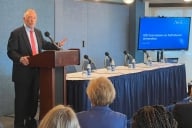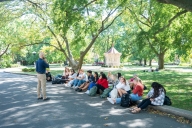You have /5 articles left.
Sign up for a free account or log in.
When Shorter University introduced four new faith statements in October, it took just five words — “premarital sex, adultery and homosexuality" — to start a controversy.
Those words are part of the university's new "personal lifestyle statement," which all employees must sign starting next year. The statement requires that faculty and staff be active members of a local church. It forbids drug use, drinking in public (including at "restaurants, concert venues, stadiums and sports facilities"), and any sex outside of heterosexual marriage. Since the Board of Trustees voted to approve the statement, a small but continuous uproar has broken out around the campus of 1,700 students in Rome, Ga., including protests, public criticism and threats from alumni to withdraw donations.
Faith statements or lifestyle requirements are not unusual at Christian colleges. But at Shorter, the statement is the clearest indicator of the impact of a court battle the university lost six years ago, when the college and the Georgia Baptist Convention went to the Georgia Supreme Court to determine who would control the college's board of trustees and, ultimately, its direction. At the time, Baptist colleges around the country were breaking away from their state conventions. In some cases, disputes were about doctrine, such as policies on gay students and faculty. In other cases, including Shorter, they were about institutional control.
But six years later, the picture looks different. Shorter and another Baptist institution, Averett University, have been drawn further into the Baptist fold. Shorter's policies are now guided by a board of trustees chosen by the church. Averett, expelled from the Baptist General Association of Virginia in 2005 after controversy about a gay student group on campus, reaffiliated with the Baptists on Nov. 9, a move that both the institution and the convention say is a first.
At Shorter, the faith statements are the first effort by trustees in a push to make the college more “intentionally Christian,” said Donald Dowless, who took office this year as the university’s president.
“Shorter has always been a Christian school,” Dowless said. “For the last six or seven years, there’s been, I suppose, a movement to define more clearly what that means.”
In 2002, Shorter’s board of trustees voted to break away from the Georgia Baptist Convention after a dispute about who would appoint the college’s board. In the past, the state convention had chosen from a list of candidates approved by the college; beginning in 2001, it began to put its own board members forward.
The state convention fought the move, and the case went to the state Supreme Court, which ruled in 2005 that the college did not have the authority to sever ties with the church on its own. Since then, the convention has chosen the college’s trustees. Dowless, who took office earlier this year, is the first president the convention-controlled board selected from outside the institution.
Lifestyle guidelines -- whether for faculty and staff, as at Shorter, or for everyone on campus -- are not uncommon at Christian colleges, particularly those that are conservative or evangelical. Shorter administrators say that the statements only put in writing hiring practices that were already in place. Since 2008, the college has hired only Christians, a condition of its membership in the Council of Christian Colleges and Universities.
But the lifestyle statement, which applies to existing faculty as well as new hires, has been widely criticized by alumni and members of the public, who say they fear the institution is becoming close-minded.
A protest at the university’s Rome, Ga., campus drew more than 100 people last month. Alumni Facebook groups, some with hundreds of members, have been filled with comments about the change, many expressing sadness and anger. One alumna copied a letter to the university withdrawing a pledge of $10,000 for a new library.
“I am sad today,” another wrote. “Sad that the Shorter I love is no more and [in] its place is a school full of fear, distrust and discord rather than a school where students and faculty alike were respected and cared about.”
Supporters of the statement have joined groups of their own -- "
Soulforce, a nonprofit group that works to end religious discrimination against gay students at Christian colleges, has heard from one faculty member on campus who is concerned for his job, said Jason Conner, the group’s community director. “They don’t want to be dishonest and not sign the policy that’s going around, but at the same time, they want to be true to who they are,” Conner said.
Soulforce conducts bus tours to Christian college campuses around the country that have policies restricting gay students or faculty. The group has not chosen campuses for its 2012 tour yet, but is aware of the situation at Shorter, Conner said. On some campuses Soulforce visits, the organization finds that faculty, staff and even administrators are opposed to policies on gay faculty or students, Conner said. In many of those cases, the policies originated with the church. "Most of the pressure from these colleges is coming from the pocketbooks of major donors and denominations,” he said.
At Shorter, the Baptist convention provides significant financial support. On Nov. 16, the college announced $7.2 million previously earmarked in the convention’s endowment will pass to the Board of Trustees, to be used for projects on campus. The university will get an additional $2 million in 2012 for operational purposes, slightly less than in 2011.
Dowless said he believes the new policies will boost enrollment among students who want to know (or whose parents want to know) that they are attending a Christian college that adheres to Baptist beliefs. Many faculty and alumni have been supportive of the changes, he added. “We are a close-knit community, but our goal is to have faculty and staff who will serve as role models for our students,” he said. “It is important to represent ourselves as Bible-believing Christians.”
Back in the Fold
Averett University, which separated from the Baptist General Association of Virginia in 2005, is having a similar religious renaissance. The college announced last week that it had restored its relationship with the state group, which was severed after a gay pride event was held on campus by the university’s Gay/Straight Alliance, among other disputes.
“It wasn’t about any single issue; it was more about a relationship where conversation stopped,” said Randy King, the university’s director of communications. “What really changed is the realization that we can do way more together than we can apart.”
Other changes were necessary as well, said Jeff Bloomer, president of the association. A new president took office at Averett in 2008 and made restoring the relationship with the Baptists a priority. “Averett decided that the former leadership had led them away from their basic DNA or their Baptist heritage and roots, and they desired to return to that,” Bloomer said.
The university no longer has an active chapter of the Gay/Straight Alliance, King said. “Our position on the issue hasn’t changed,” he said. “That’s the issue of respecting all persons, regardless of race or gender or sexual orientation.”
King would not comment on whether the group would be allowed to re-form if students expressed interest. "Students naturally come together around common interests and it's in their best interests and the university's that we meet them where they are," he wrote in an e-mail to Inside Higher Ed. "Requests for institutional funding of a formal student organization are considered relative to their consistency with the institution's mission and core values, ensuring they are not one dimensionally focused and are not based on the exclusion of others, and whether the group's stated purpose is being met or not being met through an existing student organization."
Averett does not have a lifestyle statement for employees, and does not take religion into account when hiring, King said. The college's website makes little mention of its Baptist roots. The latest faculty and staff handbook starts with a mission statement: "In accordance with our Christian heritage, we value academic and religious freedom, spiritual growth, academic excellence, diversity, and tolerance."
At Shorter, changes are likely to continue. The university will begin considering a new strategic plan early next year, and one focus will be on becoming a more intentionally Christian university -- which Dowless defines as including a belief in the inerrancy of the Bible, promoting a Biblical worldview in the classroom and hiring faculty who are believing Christians.
Those beliefs are already central to the university, he added, but there are always ways to improve, he said. "We are intentionally moving more toward Scripture,” Dowless said. “I think these decisions will help us an institution as we seek to honor Jesus Christ and to have the best academic experience we can.”
Another Georgia Baptist college, Mercer University, provides a view of an alternate path, had Shorter won at the state supreme court.
When Shorter sought independence from the Baptist convention, it used Mercer as a model: at the time, the college’s charter limited the convention’s control over the board of trustees. In 2006, not long after Shorter lost its court case, the convention cut ties with Mercer entirely, the result of a dispute about both institutional control and the rights of gay student groups.
Unlike Shorter, that separation stuck. Thus, five years later, a few days after Shorter announced its new faith statements, Mercer announced an employment policy change of its own: the Baptist university is now extending health insurance and other benefits to employees’ same-sex partners.








